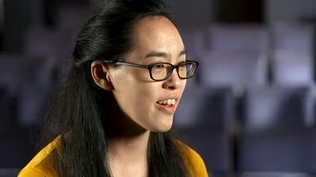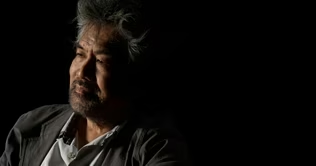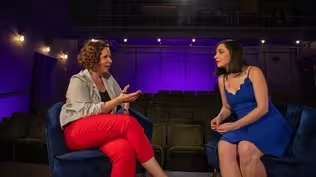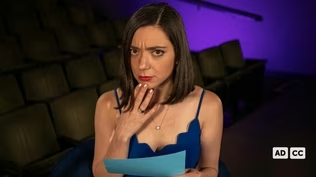
Daniel K. Isaac (AD, CC)
Season 3 Episode 3 | 26m 46sVideo has Audio Description
Actor Daniel K. Isaac discusses representation and inclusion in the entertainment industry
Actor Daniel K. Isaac (Showtime’s “Billions”) and Lynne Marie Rosenberg (HBO’s "High Maintenance") discuss the alarming rise of anti-Asian rhetoric and the portrayal of Asian characters in television and theater. Access: Audio description, captions.
See all videos with Audio DescriptionADProblems playing video? | Closed Captioning Feedback
Problems playing video? | Closed Captioning Feedback
Famous Cast Words is a local public television program presented by WLIW PBS

Daniel K. Isaac (AD, CC)
Season 3 Episode 3 | 26m 46sVideo has Audio Description
Actor Daniel K. Isaac (Showtime’s “Billions”) and Lynne Marie Rosenberg (HBO’s "High Maintenance") discuss the alarming rise of anti-Asian rhetoric and the portrayal of Asian characters in television and theater. Access: Audio description, captions.
See all videos with Audio DescriptionADProblems playing video? | Closed Captioning Feedback
How to Watch Famous Cast Words
Famous Cast Words is available to stream on pbs.org and the free PBS App, available on iPhone, Apple TV, Android TV, Android smartphones, Amazon Fire TV, Amazon Fire Tablet, Roku, Samsung Smart TV, and Vizio.
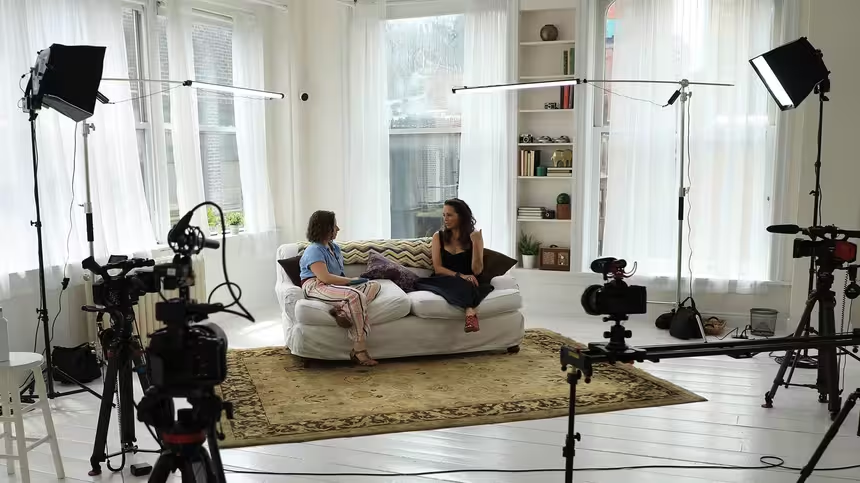
Inside the Series
Go behind the scenes of "Famous Cast Words" to learn about how the episodes came together.Providing Support for PBS.org
Learn Moreabout PBS online sponsorshipAsian-male bodies in America have been historically desexualized and neutered.
And so, if I can do my part, then here is my naked body.
Rosenberg: [ Laughs ] ♪♪ Hi.
I'm Lynne Marie Rosenberg.
Welcome to "Famous Cast Words."
I am here today with actor and writer Daniel K. Isaac.
You might know Daniel as Ben Kim on Showtime's "Billions."
You might know him from Roundabout Theatre Company's "You Will Get Sick," or you might know him from his own off-Broadway play produced by Ma-Yi Theater Company, "Once Upon a (Korean) Time."
You might not know him from being a background performer in a marine-corps training exercise for boot camp.
Welcome, Daniel.
Can't wait to hear more about the marine corps.
[ Both laugh ] So when you started on "Billions," am I correct that it was the pilot... Mm-hmm.
...and it was supposed to be just essentially one episode?
They had no guarantee of this character continuing.
Right.
I remember getting an e-mail from, uh, casting through my ex-manager that the show had been picked up and that they were going to pin me for 102, 104, 105.
You know, not even sequential episodes, but just, "They'll pepper you in through the season."
And as they did that, they said, "Well, we'll do 103 and 106 and maybe 109."
And then they filled in seven, eight, and -- Can I tell you?
I'm having a dopamine reaction to you getting those e-mails.
I'm like, "Ooh."
I know what that must have felt like.
"Oh, I -- I don't have to go wait tables this week."
Right.
Or I have to say, "Dear restaurant, I can't work this week, either."
At the end of the season, I realized I'd shot all 12.
The fact that they kept me on, I will be eternally grateful for.
It has changed my life such that I quit that restaurant.
Or rather, the restaurant took me off of their employment whatever registry, 'cause I went to log on to -- to try to pick up a shift around the holidays, And then it said, "You are no longer an employee here."
I thought, "Oh, that's my sign from the universe."
Yeah.
You're not waiting tables or bartending anymore.
-"You don't need this."
-Right.
Well, I'm always living in fear that I do, you know?
So, um...yeah.
What is your favorite part of Ben Kim?
I like to...project if not -- whether or not it's true that Brian Koppelman and David Levien know I have a single mom and I don't have a dad, and they've been these -- I call them dads, jokingly -- these father figures in my life.
And what they've written for Ben Kim has been a character that, you know, came out a little cocky, going to Stanford and Wharton, immediately got humbled by the genius that is Axelrod, played by Damian Lewis, and then has to figure out his way in a very toxic masculinity, very competitive and hard environment that people work in, you know, today, and learning to make space for himself and for his own voice.
Brian and David have written things for me to exercise that myself, a la stripping and dancing in an elevator... -I have seen that, yep.
...or -- or standing up to bullies or moments of growth that I feel parallel my own journey as an introvert or ambivert and and the quiet one in the room.
Yeah.
And knowing how to take up space or when it is appropriate to do so and that it is okay to do so, is something that the character has taught me.
Or these guys and these -- these many writers' rooms have -- have advocated for and -- and to be on that journey as we start shooting Season 7 is -- is an ongoing gift.
Yeah.
You did a run of "The Chinese Lady" in 2018, and then you did another run in 2022.
What have the differences been between doing it then versus doing it now?
When we did Lloyd's play in 2018 and talked about the difficulties of being an Asian-bodied person in America, most of the audience assumed, "Aren't you just white-adjacent?
Don't you have the same privileges?"
The -- The toxicity of the model-minority myth is such that -- that there -- there should be no complaints there.
And yet with -- with COVID and the awareness of -- of hate crimes against Asian bodies and the terrible shootings and, "And, and, and," that, when we did it in '22, we never had to convince the audience, "Look how hard it can be," because you imagine they've at least experienced one news article or one hashtag by this point that showed them, "Oh, this is a difficulty that a community experiences here."
And so how wonderful that we don't have to have the burden of labor, of convincing, and how tragic that it is because an Asian-American actor was attacked on the way to the theater at the Public or that company members of "Suffs" would get harassed or harangued on their way or leaving the theater.
And this is Astor Place when you're around NYU, and there should be a general safety to having the Blue Man Group and a bourgie restaurant and all these banks and The Cube and Starbucks there.
And yet still... -Yeah.
...there is danger, there is threat around, and -- and -- because hate is invisible, right?
-Yeah.
-You don't know who holds or harbors it and what they will do with it.
So in addition to your own performing life... Mm-hmm.
...you this year have had an off-Broadway play premiere...
Yes.
-..."Once Upon a (Korean) Time."
-Mm-hmm.
I'm always interested in exploring when you write for performance... Mm-hmm.
...as opposed to writing, say, a novel... Mm-hmm.
...you are writing job opportunities, and there's a real responsibility with that.
And, obviously, with "Once Upon a (Korean) Time," you are writing job opportunities for Korean and Asian performers.
-Mm-hmm.
Were you thinking about that as you were sort of crafting this piece?
The short answer is, yes, absolutely.
Sure.
I felt that Asian-bodied performers in America rarely got to do the thing that white-bodied performers get to do, which is play chameleonlike characters or roles in one show... -Yeah.
...where you get to do more than one thing, service more than one story, play more than one character, and use more than one set of tools in your toolbox.
And so I wanted to write a show that said, "These performers are just as talented, have just as many resources, can tell an unending amount of stories in their bodies.
Let me try to showcase that," and they delivered.
It is essentially about oral tradition, oral storytelling... -Mm-hmm.
...but the direction in it was very richly visually imagined.
What felt important to you about a really rich visual experience for that show?
-Mm.
When I wrote the play, one of my ulterior motives was that young playwrights, emerging playwrights, playwrights of color are often told, "Make something that's very easily producible."
Yeah.
A two-hander, a four-person play, a living-room set.
And I -- I hated those boundaries.
And so I wanted explosively, imaginatively, impossibly large.
And that's probably why it didn't get produced for a very long time.
-Sure.
And instead, Ralph Peña and my theater company said yes.
And the way that Ralph said yes included perhaps historically Ma-Yi's most expensive show, so I can't thank them enough for that.
And I will say, you know, it -- of course, the piece is specifically about Korean diaspora, but... as someone who comes from a Jewish diaspora tradition and even an Irish diaspora in some ways, you know, it -- it hit home very relevantly to my ancestry, as well, and I think it's so important.
You know, whenever I hear the sort of weak, thin arguments against inclusion or against representation... -Mm-hmm.
...I'm just like, "It's all relatable."
We're all human beings who many of us have come -- especially to the United States, if you look at our lineages.
Like, all of us are here for similar reasons.
You know, the experience is always going to be relatable.
Yeah.
Linda Lavin came to closing and she said, "You told my story, and I'm Jewish and you're Korean.
And I never thought that there would be these parallels there."
And -- And now when she talks about it with, say, Jewish friends who come, she'll say, "Daniel wrote a play for us."
-Yeah.
And I -- I find that so special.
And that's the dream, right, to write something so specific and yet that there's a universal access to it and -- and that -- that Ma-Yi champions this by only doing Asian-American, new plays, and yet other communities can then see themselves in that?
That is all I hope to do.
Absolutely.
I love that she said that, and I love that Linda Lavin and I have the same assessment of things.
[ Both laugh ] So now we're going to look at some breakdown language.
Now, Daniel, I imagine you've seen your fair share of breakdowns over the years.
But for anyone at home who doesn't know, a breakdown is a little bit of text that serves as a job listing for an actor.
So today we're going to look at language for male Asian-identifying characters.
The problem with these roles often starts straight out of the gate with the character's name.
Mm.
-Any Asian language.
-Mm-hmm.
Accent skills will be a common request on set.
But don't expect any sort of specificity with that request.
An accent.
-Hm.
Geographically, you're likely to face a lack of clarity, as well.
God.
And you can expect to be belittled at every turn.
But the most common thing you'll see is this.
Hm.
Spoiler alert -- it's erasure.
But if you look closely at other breakdowns, you can see all the places you've been excluded from.
Because even if we're not going to see you, you still can't be Asian.
-Mm.
I mean, your dulcet tones of your voice, it's -- it's like, to hear this, like, horrible language in your beautiful voice.
It is so cognitively, uh... -Contrapuntal.
-Yeah.
Contrapuntal.
Exactly.
Ugh, beautiful.
I also just love how many of these have these age ranges.
Mm-hmm.
40 to 90 or 50 to 90.
It's like.
"Yeah, as long as he's Asian."
-Yeah.
Right.
-"Doesn't matter."
You've done a lot of really great roles, and so I wonder how often you're seeing the really, truly, pointedly terrible breakdowns that can come out.
I want to say my team is very good at advocating for me for parts that may not have been written for Asian-bodied male, or they see the parts that they know I will respond to because they have good instincts and -- and know where my -- if not taste, then at least my -- my boundaries are.
Yes.
It has gotten better over the years.
I moved to the city in '09, so progress has been made there.
But, as always, more progress can be made because it has to happen on all sides at the table... That's right.
...down to who is writing the breakdowns.
You make an excellent point that I don't often talk about on this show, that your representation's role in representation is very important, and to have people taking care of you in that way is so vital, and, unfortunately, not -- not 100% common, I would say, for actors.
Right.
Or before there were cis female casting directors, I'm sure there was terrible language about what the female character breakdown had to be or do.
Right.
And thank goodness for the female casting directors who have now assumed positions of power, and -- and let us hope that the doors continue to open for folks of color, or where more intersections are happening in these people and in these career positions, and -- and so that the stories being told can have all of that behind it, supporting it.
-Yes.
Well, that -- I think you make such a great point that the -- the issues of representation, the actors you see on the screen are just one tiny part of where all the changes need.
Exactly.
The writer, the producer, the casting director.
That's right.
The lighting.
You know, the makeup artist.
I've had makeup artists not know what to do with my skin color, and I've had makeup artists know what to do or how to cut hair that is like mine and style it versus not.
It's not the same.
-Yeah.
And... And this one's...
It's not shady, but it's true.
Season 1 of "Billions," any person of color that stands next to a white actor looks just a little purple, or just, like, a little blue, and -- and that -- and there were changes that happened after that.
Interesting.
You know, I'd never seen lighting done so stunningly until "Moonlight" on Black bodies.
Wong Kar-wai, what he does with Asian bodies, I want that always.
And it was sad that I couldn't even expect that to be the standard for a while there.
Right.
Is there anything in particular else that you'd like to talk about with these terrible breakdowns?
Often what happens with Asian-American or Asian performers in America are -- is the, um -- the request to translate with no pay.
Yes.
That happened a lot where I would call my mom and say, "Hey, will you look at this PDF?"
And then I'd have to teach her how to open the PDF in her e-mail.
And then, "Will you help me translate this -- that sounds human."
Or I'd receive an audition and the Korean sounded so Google translate-y or just not -- not natural to one's voice, and that has since changed.
-Yeah.
And -- And I remember auditioning for "Pachinko" and that had Japanese, Korean, and English sides, and they were all done very accurately... Yeah.
...and poetically and beautifully, but I did a movie once, and I did the translation, or my mom and I did the translation work for multiple Korean characters in the movie and didn't get credit for it.
You know, I didn't know how to advocate for myself then... Sure.
...or that there should be extra pay, let alone credit involved for that.
And so I'm glad we've come some ways there, but it's still happening because -- just 'cause you say, "Whatever language you speak, if you could do that," that's still labor you are asking of someone that you wouldn't ask of, say, someone else who is white in America, where you assume they don't speak another language, and -- and -- and that prejudice is also harmful.
But, you know, there is labor, and labor should be compensated at a living wage.
And here's hoping that we continue to advocate for that.
So we have another segment for you right now.
We call it "Special Skills," where we go do something that does not necessarily have to do with representation and inclusion.
We're just going to do something fun that you enjoy.
So we have now arrived at "Special Skills."
Uh-huh.
You mentioned in an interview that you wanted to try pottery because it was something -- you wanted to try something you were bad at... -Yes.
-...and I loved that.
Now, today we're going to be even worse at that because these don't work terribly well, but we're going to make some pottery magic happen no matter what.
-We're going to try.
You're going to teach me what you know about pottery.
Okay, so let's see if I remember anything.
Great.
[ Laughs ] The first step is to take a bit of clay, I guess.
Uh-huh.
And normally you'd do something called wedging so that you get all the air bubbles out.
Mm-hmm.
You squeeze in, and you roll is how you would wedge, but we're not going to be able to really do that here.
So maybe we'll just do it on our palms.
Yeah.
Yeah.
Yeah, yeah, yeah.
That feels right.
This feels like it looks like we know what we're doing.
-Mm-hmm.
Sure.
-Yeah.
And after wedging is centering, which is why there are these rings in the... Oh.
And so the idea is to center it as -- Like, spiritually?
-Yeah.
-[ Laughs ] One hopes.
I normally work with a foot pedal, but, um, let's -- -[ Laughs ] Yeah.
Let's see what happens here as we turn a little dial.
So then you can usually tell immediately if you're off-center or not, which I can tell.
You did a really good job of making that...
Thank you.
Like, that gumdrop shape is very good.
Oh.
And you can sort of press the edges down so you know it's not going to slide.
And then we'll add water to the equation here.
Okay.
Yeah.
That's good.
It's also getting everywhere immediately.
You would normally do it with two fingers and -- and start pulling.
So you'd go down.
And I'm not centered, which is why everything is wobbling.
Sure.
And you can never use too much water here, which is why we have aprons on.
-Mm-hmm.
And you would slowly apply pressure towards the center and then pull out.
Got it.
Thereby completely stopping the weak motor.
The weak, weak motor.
Let's see what -- -I'm mesmerized.
Look what you made already.
-I'm trying here.
I work mostly in graphite and ink and so focus very two dimensionally.
And so there's something really lovely about thinking about three dimensions of a piece.
Yeah, and you're making something with your hands.
With your hands, yeah.
I really suck at -- at bottoms, which is... [ Laughs ] -So -- -We're doing great.
So everything I make ends up being a planter 'cause a hole ends up in the bottom of it.
I'm like, "Well, here's a planter."
I'd say I'd make you a plate to match, but I won't be able to.
-Right.
So I have a lot of of holey pottery objects that I've gifted to people, and I'm sure they've just accidentally broken them... or blamed their cat for breaking them.
Too fast.
Aw.
-Whoa.
Now it's like a Grecian urn after the collapse of society.
-Yes, I meant to do that.
I say that a lot.
Oh, it's over there.
-Oh.
[ Laughs ] -I, um... Man: There you go.
[ Camera shutter clicks ] [ Laughs ] You know, there's this sociology concept of parallel play where it's usually talked about in terms of children, in terms of, like, there's a stage that they enter where they're interested in playing next to kids but not necessarily with kids.
-Mm.
-I'm an only child, as well.
-Yes.
Only children.
And so there's a real, like -- Yeah, I want to read next to someone in silence.
-Correct.
-Yeah.
Yeah, absolutely.
To me, relationship-wise, too, that's all I want is someone who doesn't need my attention all the time but will read next to me.
So this show is just actually a singles' dating show, right?
Yes.
We're just telling people what our interests are and what we're looking for in our future partners.
Got it.
I understand the assignment.
That's right.
It was all a ruse.
We thought it was about representation and inclusion.
Uh-huh.
But, really, we just are trying to get laid and health insurance.
Wonderful.
-[ Laughs ] We'll take our floss.
Mm-hmm.
It's peppermint flavored.
-Oh, it smells real good.
-Doesn't it?
[ Laughs ] I use it every night.
And, um... And you could go one direction or the other.
This is where I also always mess up, too.
But you want to slide along the bottom.
So you go away from yourself.
Oh, no.
I'm sure the rule was to go towards yourself, but I just started on this side.
-Okay.
Look at this little critter.
-You made a thing.
-We made a thing, And you would put it on a little plate or whatever, and let it dry for a period of time that's not too long 'cause you can't have it be too dry.
Okay, that looks like something.
I think it's beautiful.
We've known each other for many years.
We did a reading together years ago, but mostly we have had a social-media relationship.
And I love your social media because something that you see as a problem with Asian-male representation in media is a desexualization, right?
-Right.
And you have got this, like, thirst-trap world, which I love.
What goes through your mind when you're like, "Today's a thirst trap day"?
[ Both laugh ] Isaac: I think about a number of things.
I think, at its most generous, yes, it is political.
Asian-male bodies in America have been historically desexualized and neutered, and so, if I can do my part, then here is my naked body, I don't mind.
-[ Laughs ] Yeah.
I also think it's a reminder for me to treat my body and where it is today with its own love and tenderness and care, because I can be very hard on myself in that regard.
And so let me do this for myself more than -- or in addition to the dopamine hits of someone liking it.
Sure.
And also, If I have an audience base that is maybe other gay men and say I'm telling a story for queer folks, like "Once Upon a (Korean) Time" was or to be playing a gay character in "You Will Get Sick," I want the audience that I am telling the story for to show up, and this audience pays attention to my shirtless self more than they do with my pictures with my castmates or fully clothed friends.
So I'll do both.
Something that you do on social media in addition to, um, thirst-trap pictures is you have another Instagram account called According to My Mother.
-Yes.
What sort of things might we find on this separate Instagram account?
You might find screenshots of text messages, e-mails, and transcribed conversations Korean-to-English between my single mother, who is a Korean immigrant and a wonderful human being who survived the Korean War, but is also deeply homophobic and ultra conservative, and believes in conspiracy theories, and is an anti-vaxxer and a Trump voter, "And, and, and."
And I am a gay, queer man who decided to pursue a career in the arts and am her only child and very liberal, perhaps.
Perhaps a little more progressive than she is.
Just on -- on an opposite side of the spectrum, and how -- how we relate to one another gets distilled in these little posts, and I hope you find them painfully funny and -- and -- and hilariously sad and that -- that maybe, um, they make you laugh.
Does she know about this project?
-Oh, yeah.
-Yeah.
She hates that you can't Google me without her appearing.
-Okay.
And so one -- once, she asked me to clean the Internet of her, and I thought, "Well, that's not how it works."
I think gajillionaires can do that, but that's not how it works.
Yeah, Pandora's out of the box for us regular folks.
Yeah.
-Yeah.
So sorry, Mom.
And so what's happened instead is that -- and I imagine many parents of queer children have to go through this phase in how they deal with it is...how they deal with it.
But my mom is now the closeted one about having a gay or queer son, and -- and she's in denial or she's trying to remove herself from it.
But as I progress in my career, it is harder and harder for her to be able to hide it.
One time, I was borrowing her car on a Sunday, and so she was going to church, and she had me drop her off a block away so that her church -- her fellow church members wouldn't see me.
Which then is such a reversal of the teenager who's embarrassed by their parents car or whatever, and wants to be dropped off a block from school.
So it -- it's a -- it's an ongoing thing.
Boy, it all comes back around, doesn't it?
We all wind up taking care of our parents and flipping the relationship.
Yeah.
We do.
We do, yeah.
If we're so lucky -- -Cut that.
[ Both laugh ] Daniel, thank you so much for being here today.
It has been an absolute honor to have you.
You may now go take your nap... -[ Laughs ] before the evening show.
-Thank you.
-Thank you for watching, take care of each other, and be professional.
♪♪ ♪♪
Support for PBS provided by:
Famous Cast Words is a local public television program presented by WLIW PBS
